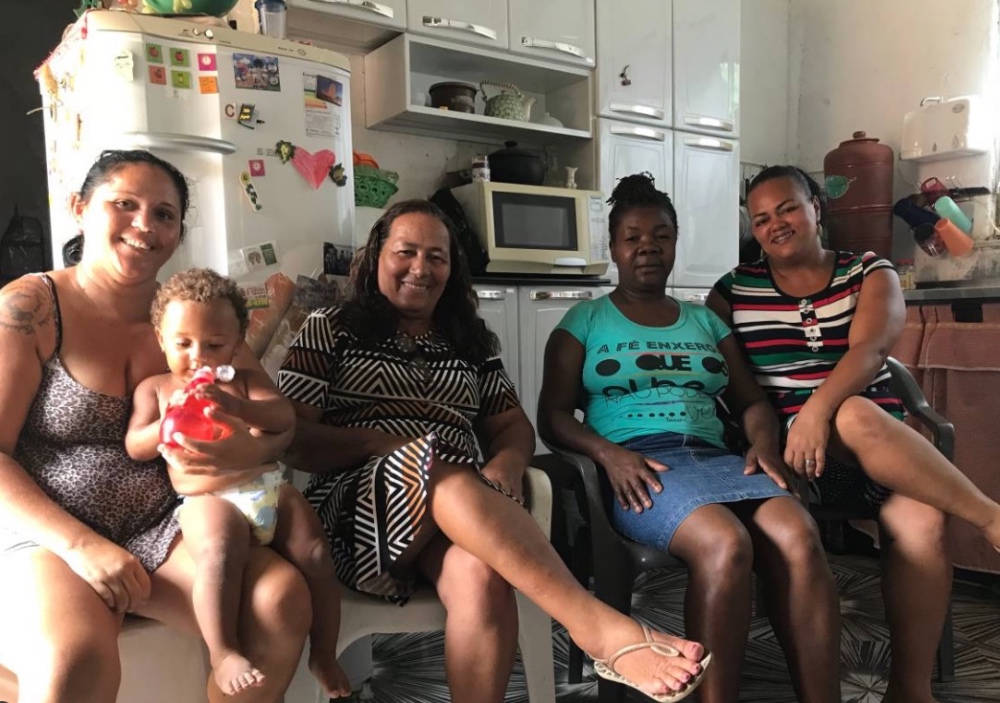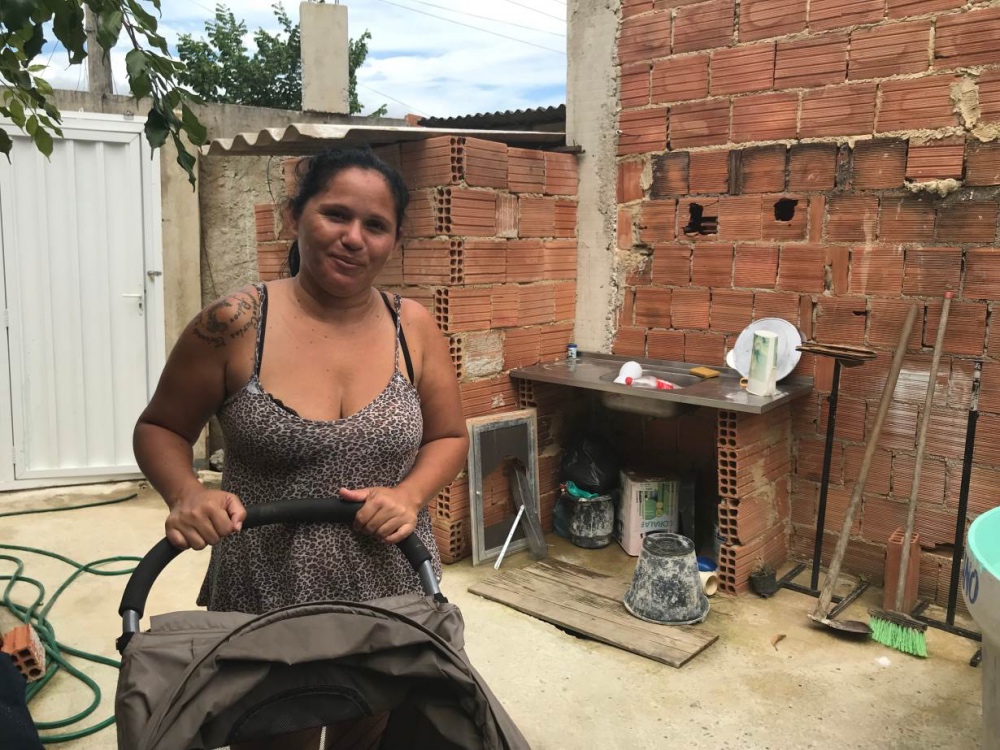
KARLA MENDES, of Thomson Reuters Foundation, reports on one woman’s 15 year fight to improve her commununity in Rio’s slums…
“Dona Edir, Dona Edir” – the call is heard frequently in the narrow lanes of Canaa, a slum on the outskirts of Rio de Janeiro.
It is for Edir Dariux Teixeira, who is well known among the residents, having spent more than a third of her life trying to improve infrastructure and basic services in the ramshackle settlement.

Glaucia Milani with a baby, Edir Dariux Teixeira, Marta da Glória Candido does Santos and Maria Silene Jesus does Anjos pose for a photo in Ms Teixeria’s house in favela Canaa in Rio de Janeiro. PICTURE: Karla Mendes/Thomson Reuters Foundation.
At the heart of that fight are legal property titles to the residents’ homes – or, more accurately, the lack of them.
“Without these documents we have no rights,” she told the Thomson Reuters Foundation, sitting close to a fan to alleviate the near 40 degrees Celsius heat funneling from her asbestos roof.
Debates on how to manage property rights in the world’s informal settlements are becoming ever more pressing, as millions of people move into cities from rural areas every year and many end up in fast-growing slums.
Rio has about 1,000 slums, known locally as favelas. They are home to nearly one in four of the city’s population and typically lack a range of infrastructure and services, experts say.
In Canaa, having title would bring certainty of tenure, and also help to get services provided: sewerage, basic sanitation, and tarred streets, said Teixeira.
“I am anxious. I pray every day (for land titles).”
– Edir Dariux Teixeira
“I am anxious. I pray every day (for land titles),” the 59-year-old said.
When she moved to the area 22 years ago, there was a lack of all basic infrastructure in Canaa, including clean water, pavements and lighting.
Ms Teixeira realised change had to be driven by the residents’ themselves and took the lead in trying to improve the area.
“There was nothing here. It was all jungle,” said housewife Glaucia Milani, who has been living in the favela for 25 years. “Now things are getting better because of Dona Edir’s help.”
Ms Milani said apart from helping residents to get legal title to their land, Ms Teixeira has been organising food and clothes donations for the favela and its 300 families.

Housewife Glaucia Milani poses for a photo at the patio of the house of the leadership of favela Canaã in Rio de Janeiro. PICTURE: Karla Mendes/Thomson Reuters Foundation/
“Dona Edir is a great mother to us. Anything she can help us, she helps…Dona Edir solves everything for us,” Ms Milani, 31, said. “Dona Edir is a warrior.”
Getting land titles for the residents is no easy task, Ms Teixeira said, not least because some residents have bought land from private owners, while others are squatting.
Her own plot of land was donated by an uncle of her ex-husband but neither Ms Teixeira nor the other residents have official proof of ownership.
ITERJ, the government body in charge of managing land in the state of Rio de Janeiro and responsible for Ms Teixeira’s request to get titles for Canaa’s residents, did not respond to requests for comment.
Most of the favela’s streets got temporary pavements about five years ago but Ms Teixeira said it happened only after she asked a politician for help because taxis were refusing to enter Canaa because the roads were full of potholes.
Despite Ms Teixeira’s efforts, the residents in the favela about 65 kilometres from Rio’s city centre are still waiting for the streets to be fully paved, sidewalks to be built and manholes to be constructed.
“Dona Edir is a great mother to us. Anything she can help us, she helps…Dona Edir solves everything for us. Dona Edir is a warrior.”
– Glaucia Milani, who has been living in the favela for 25 years
Ms Teixeira has asked the city to fully pave the streets, provide sewerage infrastructure and a health post for the favela.
In emailed comments to the Thomson Reuters Foundation, Rio’s city hall said the favela was “urbanised” four years ago but did not immediately respond to requests for details about which services were provided to the area.
A “very shocking scene” at school when Ms Teixeira was eight-years-old prompted her decision to dedicate her life to fighting justice, she said.
While she and a boy were having a snack during a school break, another girl asked the boy to give her a piece.
“The boy said: only if you spread your legs,” she said. “Then she immediately spread her legs and…he gave her a bite. That broke my heart.”
At 15, Ms Teixeira was raped and later witnessed the rape of a friend, experiences she said strengthened her resolve to help women. Ms Teixeira has been working for many years as a volunteer at a charity that distributes food in Rio’s poor neighborhoods, including Canaa.
She was honoured for her work with a prize from the Federação de Mulheres Fluminenses, a Rio-based women’s federation.
Meanwhile, Ms Teixeira, who survives on her father’s pension and cleans houses to make money, spends whatever she can of her income – equivalent to $US300 a month – on building a school in the patio of her house.
“I do the construction works myself. When there is any money left I pay a professional to do the harder things,” she said.
Beyond literacy, her school will offer a range of classes: cooking, sewing, handicrafts and theater.
“That is my dream…My dream is to take the kids off the street…because they have nothing to do (here),” she said in tears.
“There are lots of volunteers. What is missing is money to finish the school.”
Ms Teixeira hopes the city will officially recognise Canaa as the favela’s name – it is the Portuguese version of Canaan and was chosen by her in reference to a passage from the Bible of a land promised by God to chosen people.
“We have to have faith. The faith in God is what keeps me standing. And the victories make me keep going,” said Ms Teixeira.





